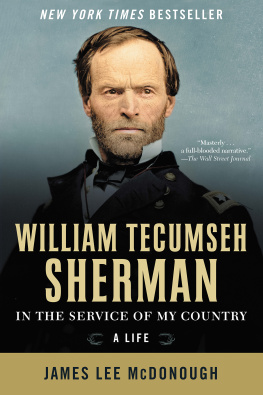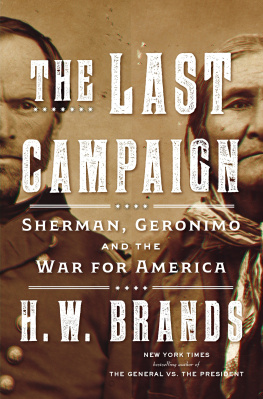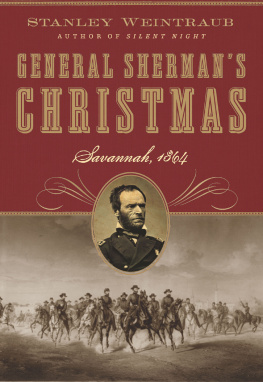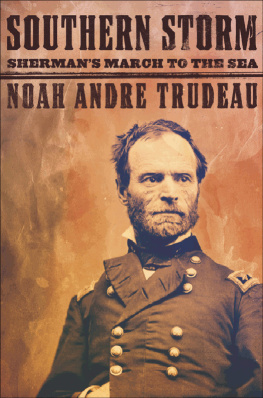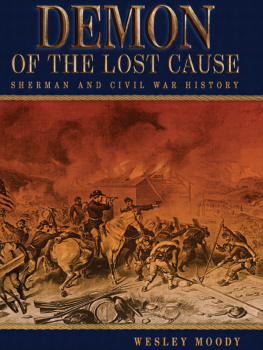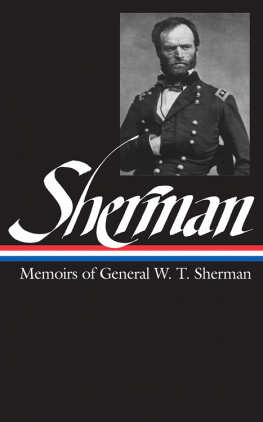
WILLIAM TECUMSEH
SHERMAN
In the Service of My Country
A LIFE
JAMES LEE McDONOUGH

W. W. NORTON & COMPANY
Independent Publishers Since 1923
New York London
To my former students at Lipscomb University,
Pepperdine University and Auburn University,
who understood and appreciated
the significance of history
T ecumseh, who was a Shawnee warrior, became the most famous Indian leader of his age, widely known among both white settlers west of the Appalachians and Native Americans. Some said his name meant Shooting Star; others translated it as Crouching Panther. The son of a Shawnee father and a Creek mother whose parents once had lived in the region known as Tennessee, Tecumseh traveled south from the Ohio area in the early 1790s, at the urging of his older brother Cheeseekau. Bringing a band of Shawnee warriors to reinforce the group led by Cheeseekau, and in tandem with Chickamauga Indians, Tecumseh engaged in raiding the Cumberland River Valley settlements in the general vicinity of the fledgling, decade-old town of Nashville. When Cheeseekau was killed, Tecumseh, then only about twenty-four years old, was selected as the new leader. For several months he and his Shawnees continued raiding Tennessee settlements, before returning to the Ohio country upon learning that a United States Army, led by Revolutionary War hero General Mad Anthony Wayne, was advancing into that area.
Tecumseh was greatly disturbed by the ever growing encroachment of white settlers. He sought to devise a plan that would protect all Indian peoples. Convinced that Native Americans could not live alongside whites without sacrificing their way of life, the chief envisioned a vast intertribal confederacy, encompassing Indians everywhere and dedicated to arresting the United States takeover of Indian lands. Indians,
Wherever he spoke, the tall Tecumseh made converts as his eyes burned with supernatural luster, remarked a witness, and his whole frame trembled with emotion, and his voice resounded over the multitude. What Tecumseh apparently hoped to achieve was a kind of Indian holy war, in alliance with the king of England, to overthrow the new American nation. Presumably he foresaw a restoration of British colonial status as the fate of the Americans once they were defeated. But not all Indians responded, and probably their numbers would not have been sufficient for the task if the converts had reached 100 percent.
Then the War of 1812 began and the Shawnee chief viewed the conflict as a great opportunity to achieve his vision of a vast, inviolate Indian territory. As an ally of the British, he commanded about 2,000 warriors, and contributed significantly to British successes early in the war. Ultimately however, he ran afoul of British Colonel Henry Proctor, who possessed neither the abilities nor the humane instincts of the Shawnee leader. Above all, the Englishman did not share the goals of his Indian ally. A discouraged Tecumseh attempted to persuade Proctor not to withdraw into Canada, but his arguments failed to convince the colonel.
The end came in October 1813, when Tecumseh perished a short distance north of Lake Erie, at the Battle of the Thames. As the Shawnee chief and his warriors fought to cover the British retreat to eastern Ontario, Tecumseh reportedly was shot again and again while encouraging his men to stand and fight. Stories circulated that after the battle depraved whites, in quest of souvenirs, cut strips of skin from Tecumsehs thighs. Another report alleged that a group of Kentuckians skinned
A little over six years after Tecumsehs death, on February 8, 1820, a white woman in Ohio named Mary Sherman, gave birth to her sixth child, a son whom Charles Robert Sherman, husband of Mary, christened Tecumseh. Considering that many Americans despised Indians, one might suspect that Charles Sherman had played a cruel joke on his infant when he pinned Tecumseh on him. Charles Sherman had no such perverted goal in mind. He called his son Tecumseh because, however unlikely for a white man of that era, Charles Sherman deeply admired the Shawnee warrior. Years afterward the son would write, I think my father... caught a fancy for the great chief.
Tecumseh was not only an inspiring leader of his people. In a war often characterized by torture, mutilation, scalping and burningsometimes involving the wounded and prisoners, sometimes even women and childrenhe had been known to show mercy. He reportedly denounced both Indians and his British allies for inhumane practices. Legends grew of his personal intervention to stop massacres. Charles Sherman was not the only white man who believed the reports of Tecumsehs magnanimity. Those who did believe, a distinct minority to be sure, nevertheless constituted refreshing evidence that at least some white men were capable of being fair-minded about racial and cultural issues.
For Charles Sherman, Tecumseh likely represented both a noble and a romanticized character. After the Shawnee chieftains death, Charles Sherman decided to name his next son after the legendary Indian leader. However, Charless wife, Mary, insisted that their new son, born in 1814, be named for her brother James. Already an earlier son had been named for her other brother, Charles. Their first girl had been named for the mother (but Mary Elizabeth Sherman was known as Elizabeth), and
That name, in view of the boys eventual role in Native American relations, proved to be packed with irony. Soon after graduation from West Point, young Tecumseh experienced his initial contact with Indians, and from the start was plagued by a conflicted attitude toward them. The stoic resignation of a band of Seminole captives in Florida impressed him, perhaps because he himself could be stoically inclined at times. I wish you could see the group in its savage state, he wrote his brother John. Although many have lost their husbands and fathers and wives and children, yet they show no grief. Several were badly wounded. One little girl, with a ball through the back and coming out in the cheek scarce utters a murmur, while a grown woman, suffering from buckshot through and through, bears it with the fortitude of a veteran soldier.
About three years later, writing from near Marietta, Georgia, the young soldier spoke movingly of the Cherokees, who used to live here but a few years ago. They had good homes, fields and orchards, and had made rapid advances to civilization, but a Christian people wanted their lands and must have them. In disgust, Sherman vented his anger at the manner in which Americans had mistreated those Native Americans. If ever a curse could fall upon a people or nation for pure and unalloyed villainy towards a part of Gods creatures, he raged, we deserve it for not protecting the Cherokees that lately lived and hunted in peace and plenty through the hills and in the valleys that stretch from the base of Kennesaw Mountain.
Yet, even as early as his sojourn in Florida, and despite a degree of sympathy both then and later for the plight of the Indians, Sherman generally viewed Native Americans as inferior beings. Talking with the Seminoles was a waste of time, he thought, for they will break their word when it is to their interest, and he concluded that the only way to
Occasionally, to be sure, Sherman would manifest a sympathy for those poor devils, more to be pitied than dreaded, as he wrote General Grant in August 1866. In essence, though, he continued to view Indians as tragic figures: a people doomed because they would not, perhaps could not, transform their way of life into that of the white man. From time to time, Sherman might speak harsh words against the despicable and lawless acts of Americans greedy for Indian land. In fact, he undoubtedly despised the whole dirty business, involving the U.S. Army, which he loved, with the clashes between Native Americans and frontiersmen. But in the final reckoning, he believed that the outnumbered red tribes, burdened by, as he viewed them, a more primitive way of life, would not survive the onrush of a superior people.
Next page
